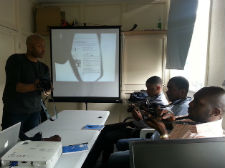Project Updates
Minding Black Histories in War Times: Remembering, Acknowledging and Documenting the Contribution of Black Poppies in WWI
On 19, Jul 2016 | In Project Updates | By Nicola Gauld
This project, supported by the Voices community research fund, is designed to tell the stories of Congolese servicemen of the First World War.
Working closely with the Voices of War & Peace Engagement Centre, the HLF, and community partner the African Community Heritage Hub (ACHH), this research will first map existing academic, community and artistic projects which look at unacknowledged black contributions to wars of European origins, with a focus on the Great War. Starting from the premise that the duplication of efforts undermines the impact of all WWI centenary commemoration activities and projects, we will invite representatives from these groups to join us in person when possible, or online, for a Community Development Day where we discuss what’s been already done, build on each other’s experiences and share key learning outcomes.
Building on the hub’s networks within black, African and Caribbean communities in Birmingham and in the West Midlands, this research will then attempt to localise and connect with descendants and living relatives of black poppies (using Stephen Bourne’s concept for black soldiers who fought alongside the British armed forces (Black Poppies, 2014)) who served in the 1914-18 war. We will support the hub to train 5-7 young volunteers as part of a Training of Trainers (ToT) programme in photography, visual and digital storytelling techniques who will then document forgotten stories of these black servicemen through a series of interviews with their relatives, friends and connections in the UK and back home, both face-to-face and online. These photographs and digital narratives will form the basis of an exhibition to be launched at an end of project Black Community Day event which will take place in October 2016, to coincide with Black History Month.
The ACHH has already identified, through its own networks, two Midlands-based relatives of Congolese soldiers who were part of the Eastern Africa Campaign Front. This pilot project will support the hub to uncover at least three others, and to document their stories through photographic and digital narratives.
The first training workshop took place on June 23rd, 2016. Led by Andrew Jackson of SomeCities. This was the first of three planned sessions to introduce and build skills in photography and digital storytelling. In the workshop, Andrew led three participants through the various functions of their cameras, and guided them on a walk around Balsall Heath in order to put this new theory into practice. The workshop finished with a review of photos taken on the walk and further discussion of how to select and arrange the pictures in order to construct a narrative. More workshops are planned to further these skills, and to include an expanded number of participants.
Andrew opened the workshop by asking our participants how and why they already take pictures – using mobile phone to take selfies, to record the day’s outfit, in order to remember something – and then introduced the digital compact camera. After taking a few shots around the room using the AUTO setting, Andrew started to introduce the camera’s manual functions. He demonstrated the kinds of artistic effects that can be the result of carefully considering shutter speed, aperture size, and other manual settings. At first, using manual settings seems like more bother than it’s worth – a picture is a picture, right? – but Andrew showed what a difference these settings can make in determining how a photograph can be read, and what meanings it can communicate.
After some intense theory, it was time for a walk around the neighbourhood to put everything into practice. At first it was clear the participants were concerned about doing things right; Andrew’s advice was to take as many photographs as possible – for example, capturing the same subject from different angles – so as to have a good number of options out of which to build their narrative. As the walk went on, the participants did get more and more comfortable with their task, taking advantage of the clear weather to start seeing the streets as photographers.
After the walk concluded, Andrew led the participants through evaluating and selecting which photographs to use to tell their stories. The final section of the workshop was an overview of portraiture, in which Andrew shared some of his own work and shared some strategies for putting a portrait subject at ease in order to make a meaningful and evocative photograph.
The participants will use these cameras for the duration of the project, taking them on long-term loan until next workshop in the early fall. It was exciting to see this workshop happen, to see young people gaining transferable skills to help them get involved in telling stories about their community.
We are planning a Community Development Day at the end of September, to bring together groups working on black histories of the Great War to discuss community-designed research and impact. Invitations will be sent out soon – please get in contact with Charlotte Stevens <charlotte.stevens@bcu.ac.uk> if you are working on this area!



